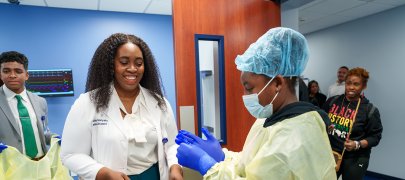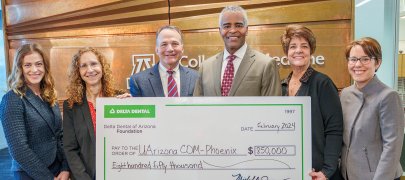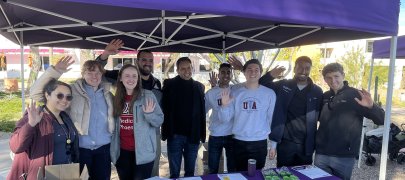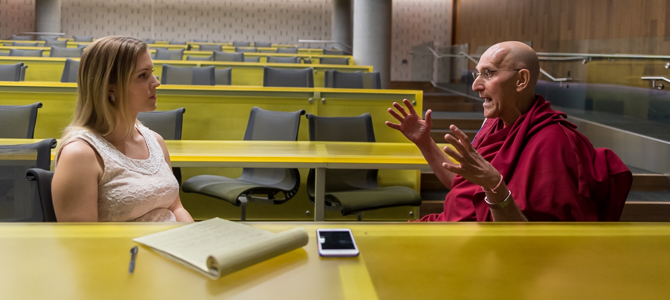
Dalai Lama’s Physician Visits College, Shares Life Lessons

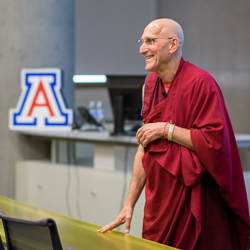
In addition to offering medical care and advice to the Dalai Lama, he has provided free medical care for 28 years, truly living his commitment to bettering the lives of others. “I feel like what I do is humanism,” he said.
Dr. Kerzin gave a special presentation at the University of Arizona College of Medicine – Phoenix on April 25, where he discussed active compassion and how to move beyond empathy.
“Emotions inform disease in the body,” he told faculty, staff and students at a lunchtime lecture. “We are trying to get people to a higher level of well-being.”
Dr. Kerzin stressed the importance of remaining compassionate and focused on the positive things in life. “Compassion is the wish and then the action to relieve physical and mental pain,” he said. “Compassion puts us in a state of joy.”
At the end of the session, Dr. Kerzin taught attendees the basics of meditation and mindfulness and answered questions. When asked what he had learned from serving as the Dalai Lama’s personal physician, he said, “I’ve learned how to be happier and how to be more oriented toward others. You get so much out of helping other people that it’s almost selfish.”
Dr. Kerzin also said the Dalai Lama — or “His Holiness” — blends the art of being perfectly relaxed while remaining completely alert. “I’ve never seen that in another person,” he said. The Dalai Lama ordained Dr. Kerzin as a Monk.
Michael Foley, MD, chair of the Department of Obstetrics and Gynecology at the college, attended the lunchtime session with Dr. Kerzin. Dr. Foley shared a reflection based on Dr. Kerzin’s remarks: “Empathy is the capacity to understand and feel what another person experiences. It represents the inner sphere of a relationship that is both personally rewarding and emotionally fatiguing."
“Compassion is the aptitude to show concern, love, tenderness and sensitivity without necessarily sharing an experience. It is the outer sphere of a relationship which becomes more sustainable than empathy,” he said.
Dr. Kerzin expanded upon his message of hope and human kindness at the evening’s Mini-Medical School community lecture, part of a free, signature series open to the public, where Dr. Kerzin discussed not only compassion, but the “why” of medicine.
When asked about the future of medicine, Dr. Kerzin said it lies in self-compassion and wellness. “People are recognizing burnout and the need to take care of themselves,” he said. “Wellness incorporates the idea of balance — a harmony between the body and the mind.”
Researchers at Princeton University and the University of Wisconsin – Madison, studied Dr. Kerzin’s brain while he was meditating, to better understand how meditation relieves stress.
The results? “They discovered that my prefrontal cortex was bigger,” Dr. Kerzin said. “This area of the brain plays a role in planning complex cognitive behaviors, personality expression, decision making and moderating social behavior.”
Dr. Kerzin is an affiliate professor at the University of Washington Tacoma, a visiting professor at Central University of Tibetan Studies in Varanasi, India, an honorary professor at the University of Hong Kong and a former assistant professor of medicine at the University of Washington. He also is a fellow at the Mind and Life Institute and consults on compassion training for the Max Planck Institute in Leipzig, Germany.
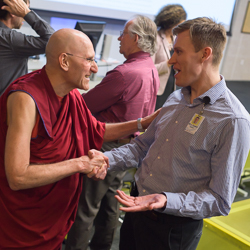
He is founder and president of the Altruism in Medicine Institute (AIMI) and founder and chairman of the Human Values Institute (HVI) in Japan.
Bentley Bobrow, MD, CPR University lead and distinguished professor of Emergency Medicine at the College, said hosting Dr. Kerzin was “an honor and of great practical value.”
“Today's fast-paced, rapidly advancing and technologically driven health care demands our constant focus. In the midst of this it is easy to lose sight of the ‘why’ we dedicate our careers and ourselves to medicine,” Dr. Bobrow said. “Dr. Kerzin engaged faculty, students and our community with pragmatic strategies to help each of us be more effective doctors and healthier people."
Article by: April Fischer
About the College
Founded in 2007, the University of Arizona College of Medicine – Phoenix inspires and trains exemplary physicians, scientists and leaders to optimize health and health care in Arizona and beyond. By cultivating collaborative research locally and globally, the college accelerates discovery in a number of critical areas — including cancer, stroke, traumatic brain injury and cardiovascular disease. Championed as a student-centric campus, the college has graduated more than 800 physicians, all of whom received exceptional training from nine clinical partners and more than 2,700 diverse faculty members. As the anchor to the Phoenix Bioscience Core, which is projected to have an economic impact of $3.1 billion by 2025, the college prides itself on engaging with the community, fostering education, inclusion, access and advocacy.
